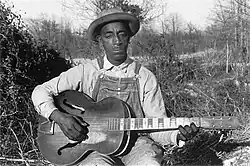Blues

Blues is a music genre and musical form that originated among African Americans in the Deep South of the United States around the 1860s. Blues has incorporated spirituals, work songs, field hollers, shouts, chants, and rhymed simple narrative ballads from the African-American culture. The blues form is ubiquitous in jazz, rhythm and blues, and rock and roll, and is characterized by the call-and-response pattern, the blues scale, and specific chord progressions, of which the twelve-bar blues is the most common. Blue notes (or "worried notes"), usually thirds, fifths or sevenths flattened in pitch, are also an essential part of the sound. Blues shuffles or walking bass reinforce the trance-like rhythm and form a repetitive effect known as the groove.
Quotes about blues music
- The blues is more than a genre—it’s the raw, unfiltered voice of human emotion. Born from the spirituals, work songs, and field hollers of African American communities in the Deep South, blues music gave shape to joy and sorrow, resilience and despair. With just a few chords and a whole lot of soul, it built a foundation for nearly every form of popular music that followed, from rock to R&B, country to hip-hop. What makes a great blues song? It’s not just the guitar licks or the wail of a harmonica—it’s the story it tells. Blues is about lived experience. Whether it's heartbreak, hardship, or hard-won wisdom, the best blues songs tap into something timeless and universal. These songs often speak in simple language, but what they say can hit harder than any symphony.
- Paul McGuinness of Classical Music (May 22, 2025) [1]]